
Getty Images/Stock photo
Danny Bradlow, University of Pretoria
Africa is facing a profound crisis that could set its development back a generation. It needs a solution to its debt problems that doesn't cripple countries.
|

Shutterstock
David M. Greenberg, University of Cambridge; Ilanit Gordon, Bar-Ilan University
When we sing together, our social brains are activated to produce oxytocin, which makes us feel more connected.
|
COVID-19
|

Marilyn J. Roossinck, Pennsylvania State University
COVID-19 and SARS are both deadly – but different. SARS symptoms were quick to appear, making it easier to contain. Because health officials were able to contain it, the virus died off.
| |

Austin Nguyen, Oregon Health & Science University; Abhinav Nellore, Oregon Health & Science University; Reid Thompson, Oregon Health & Science University
Researchers from Oregon Health and Science University found that variations in genes that code for parts of the cellular alarm system might play a role in how well people fight off COVID-19.
|
|
|
Health + Medicine
|

Ioannis Akoumianakis, University of Oxford; Charalambos Antoniades, University of Oxford
Millions of lives could be saved with this simple drug combination.
| |

Jerilynn C. Prior, University of British Columbia
Science shows that many perimenopausal miseries — such as hot flashes, night sweats and trouble sleeping — are caused by excess or variable estrogen, not by "estrogen deficiency."
|
|
|
En español
|

Jesús Román Martínez Álvarez, Universidad Complutense de Madrid
Esta solución, que pudo ser apta para dar respuesta rápida a la urgente necesidad de alimentar a niños desfavorecidos, ya tendría que estar resuelta siguiendo criterios técnicos y nutricionales.
| |

Miguel Bustos Rubio, UNIR - Universidad Internacional de La Rioja ; Ana Isabel Pérez Cepeda, Universidad de Salamanca; Demelsa Benito Sánchez, Universidad de Deusto
Los poderes públicos deben centrar sus esfuerzos en desarrollar políticas que mitiguen los altos índices de pobreza en España y que aumentarán tras la pandemia de la COVID-19.
|
|
|
En Français
|

François Meurens, Inrae
Parce qu’ils développent une approche d’ensemble des problématiques sanitaires, les vétérinaires peuvent apporter une aide précieuse dans la crise actuelle… Encore faudrait-il les solliciter.
| |

Roger Baldacchino, Centre national d’études spatiales (CNES)
Trois vidéos de phénomènes aérospatiaux non identifiés ont été rendues publiques par les autorités américaines. Voici l’éclairage du GEIPAN, la structure française en charge d’étudier ces événements.
|
|
|